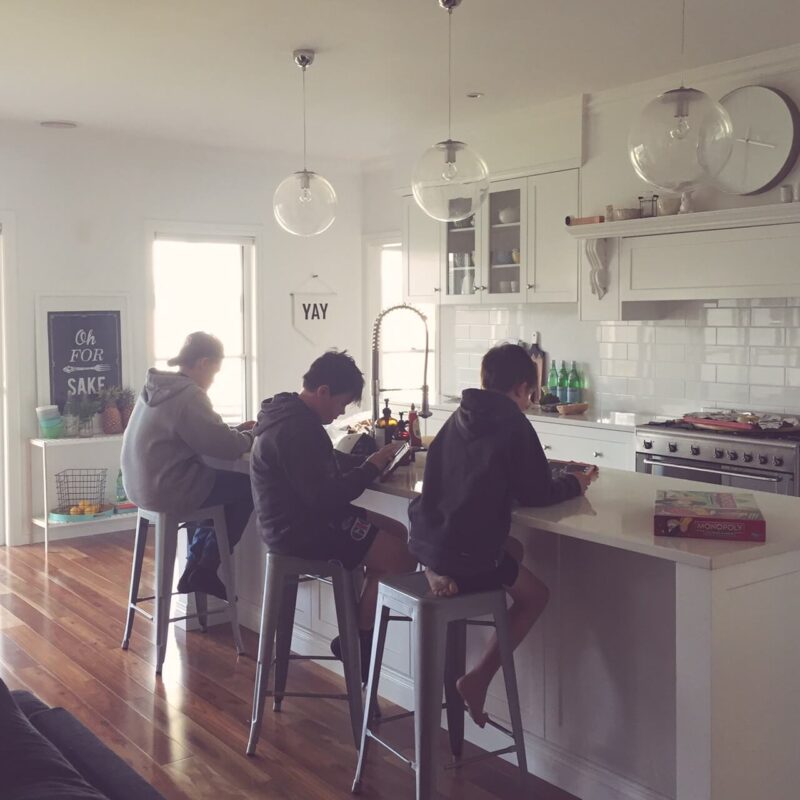Brought to you by Optus. As a mother of three boys (one in high school), I am pretty passionate about the role of digital media in their lives. My mum always says to me, “thank god this wasn’t around when you were at school because you would have driven me mad…” and I probably would …
Brought to you by Optus.
As a mother of three boys (one in high school), I am pretty passionate about the role of digital media in their lives.
My mum always says to me, “thank god this wasn’t around when you were at school because you would have driven me mad…” and I probably would have too! I love technology and I am a big user of social media. I love it for so many reasons, but I am also not blinded to the effect it can have on our young people.
Today’s Generation Z (aged 7 – 21) is the first generation to have never known the world without the Internet – can you imagine that! – and the transition from primary to secondary school goes hand-in-hand with a significant increase in Internet use, mobile phone access and social media uptake.
There’s always a level of worry when it comes to my children on social media but we talk about the bad side of it and discuss how to stay safe online all the time. I always try to keep an eye on my children’s behaviour though so I can spot when social media is affecting them or when they’re using it excessively and that’s when I’ll step in. I use Facebook and Twitter regularly but social media is constantly evolving and children are now using platforms that I don’t even understand, such as SnapChat.
I’ve had a few hairy instances myself on social media and I’ve seen a few unfold online so by drawing from my own experiences on social media, I hope I can help educate my own boys on its proper use.
Social media plays a massive role in youngster’s lives and although it’s quite scary it’s here to stay. I would like to see schools introduce it into the curriculum from an early age but I also think parents can talk to their children about right from wrong without understanding the first thing about social media.

Here are some staggering stats gathered via the Optus Digital Thumbprint Report:
Half of young adults wish they had understood the consequences of social media before engaging with it and 70% of young adults are concerned about their safety when using social media:
- 39% obsessively compare their life and achievements to others on social media
- 37% regret one or more selfie they shared online
- FOMO (fear of missing out) affects a quarter of those surveyed (24%), causing them to be hooked on social media,
- 21% find it difficult to get over past relationships
- 17% feel bad about themselves when selfies they post don’t receive enough likes
80% of parents are concerned about their children’s online safety and 9 in 10 want to see schools integrate lessons about social media etiquette and how to stay safe online into the curriculum:
- The risk of attracting strangers is their biggest worry (58%)
- Viewing unsuitable material (47%)
- The risk of online grooming (37%)
- Identity fraud (34%)
- The impact selfies could have on their children’s education and employment prospects (23%).
I am not surprised by these stats really and can see how easy it is for kids to get caught up in a digital world, especially when they don’t understand what they are doing or haven’t been taught right from wrong. Optus Digital Thumbprint initiative, is a free digital citizenship education program for secondary schools in Melbourne, Sydney and Brisbane, that teaches students the benefit of a positive online presence.
Consisting of three face-to-face, curriculum aligned workshops tailored for students in grades 7, 8, 9, 10, 11 and 12.
To date, over 84,500 students in 176 high schools have taken part in the workshops, which focus on a range of topics including:
- Keeping safe and secure online
- Safeguarding personal information
- Advantages of a positive online presence
- Consequences of online and social media use
- Dealing with antisocial behaviour online
- Distractions studying Vs socialising online
I’ve been talking to my boys about the internet for the last two years now. I’ve mentioned a few instances where I’ve had a rough run and explained to them how I felt and what affect it had on me. Basically, I want them to know that they are never ever to say unkind things, argue with or abuse anyone from behind a computer screen. In our house, the same rules apply in the school playground as they do on the internet.
I want them to understand that the internet and social media are not always happy places and if something happens they must tell me about it. But I also teach them about the positive aspects, such as my work online, the way I network using Twitter and Instagram and the great people I speak to everyday because of it.
How do you feel about your kids living in an online world? Do you think parents or schools need to take a bigger role?
Be the first to read my stories
Get Inspired by the World of Interior Design
Thank you for subscribing to the newsletter.
Oops. Something went wrong. Please try again later.







Comments
Yvette
Great post Katrina! At my six year olds school they put fear into the kids saying its bad to use social media which I think is wrong. Primary schools need to embrace the changes. FOMO is so real in my teenagers world too and comparison is huge too. A lot of my daughters friends follow my IG account and as a consequence my daughter gets teased a lot. Geez those stats are an eye opener. Xx
Helen
This is a great read Katrina ! The statistics are frightening, but moreso the topics of these statistics … I think the Optus Digital Thumbprint initiative can only just arm this generation with more information – kids living in an online world is ‘just the way it is now’ whether we like it or not – we as parents need to keep up with what is out there that our kids have access to and do our best as parents to keep them safe (I have a son who is turning 17 and still feel this way) schools should be playing a large role in educating the next group coming through even more … I have a friend who is a teacher of primary years and is saddened by the fact that many young children can’t hold a pencil because a large portion of their lives are spent on a tablet tapping away – everything is moving so fast so the more we can teach them the better !
Marina
I have four kids, two who have recently stepped into independent living (one living with 3 friends in a rental house, the other off to Uni). We have been fairly relaxed about social media and internet use, but we have never been shy in having conversations about what is on the internet and how a post can live on far beyond what you had ever planned. With two more still at home, we’ll continue our approach as is seems to be working.
I was saddened to discover that some of their peers have fallen into the trap of believing ‘the perfect life’ projected by so many on social media, but also their antics to strive to gain attention and acceptance through posting or sharing inappropriate images.
I was a little surprised, as it’s not in their immediate circle. I’ve had a few conversations with parents of their friends who have remarked that ‘this generation is boring’! Comparing notes of what we all got up to in our early adult years, our kids would be considered a little tame. They have access to alcohol, but don’t indulge on a regular basis – or over indulge when they do. (They had a few experimental nights – but it didn’t capture their imagination). They all have digital devices, but they share the fun aspects of their lives and as they have a strong friendship network – they don’t feel the need to seek validation in their online world.
They go 4WDing and skateboarding. They talk about their plans for the future.
The biggest difference I see with our kids network and others in our community who are ‘oversharing’ is the knowledge base they have. They understand that when you put something on the internet – it’s there for life. The digital footprint is like carving in stone.
They have been challenged by us, as to what they are doing and what they want to project onto the world. We’ve taught them to post with one fact in mind – ‘would this affect you in the future?’ It seems to be working.
School messages often are in competition with peer group pressure. The only thing that can counter that is self belief. And that starts before we hand them an iPad.